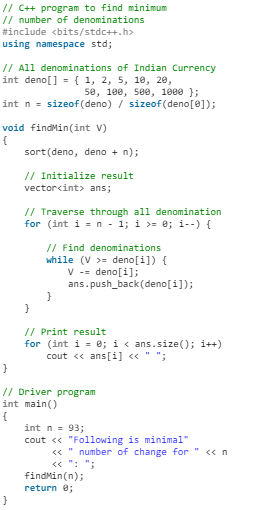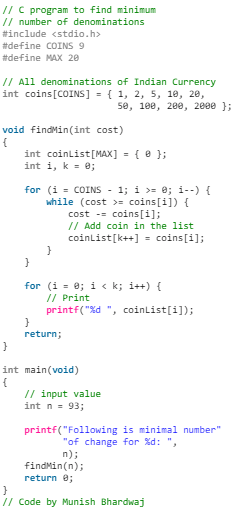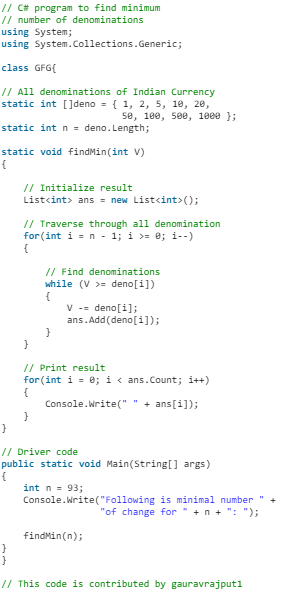Greedy Algorithm to Find Minimum Number of Coins | Algorithms - Computer Science Engineering (CSE) PDF Download
Greedy Algorithm to find Minimum number of Coins
Given a value V, if we want to make a change for V Rs, and we have an infinite supply of each of the denominations in Indian currency, i.e., we have an infinite supply of { 1, 2, 5, 10, 20, 50, 100, 500, 1000} valued coins/notes, what is the minimum number of coins and/or notes needed to make the change?
Examples:
Input: V = 70
Output: 2
We need a 50 Rs note and a 20 Rs note.
Input: V = 121
Output: 3
We need a 100 Rs note, a 20 Rs note and a 1 Rs coin.
Solution: Greedy Approach.
Approach: A common intuition would be to take coins with greater value first. This can reduce the total number of coins needed. Start from the largest possible denomination and keep adding denominations while the remaining value is greater than 0.
Algorithm
- Sort the array of coins in decreasing order.
- Initialize result as empty.
- Find the largest denomination that is smaller than current amount.
- Add found denomination to result. Subtract value of found denomination from amount.
- If amount becomes 0, then print result.
- Else repeat steps 3 and 4 for new value of V.
- C++

- C

- Java

- Python3

- C#

Output:
Following is minimal number of change
for 93: 50 20 20 2 1
Complexity Analysis
- Time Complexity: O(V).
- Auxiliary Space: O(1) as no additional space is used.
Note: The above approach may not work for all denominations. For example, it doesn’t work for denominations {9, 6, 5, 1} and V = 11. The above approach would print 9, 1 and 1. But we can use 2 denominations 5 and 6.
|
81 videos|80 docs|33 tests
|
FAQs on Greedy Algorithm to Find Minimum Number of Coins - Algorithms - Computer Science Engineering (CSE)
| 1. What is a Greedy Algorithm? |  |
| 2. How does a Greedy Algorithm find the minimum number of coins? |  |
| 3. What is the time complexity of the Greedy Algorithm for finding the minimum number of coins? |  |
| 4. Can the Greedy Algorithm always find the minimum number of coins? |  |
| 5. Are there any other algorithms to find the minimum number of coins apart from the Greedy Algorithm? |  |

|
Explore Courses for Computer Science Engineering (CSE) exam
|

|






















